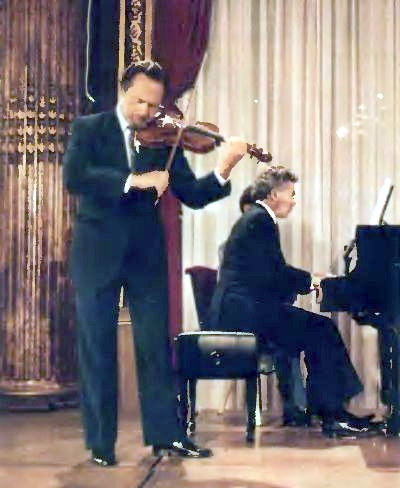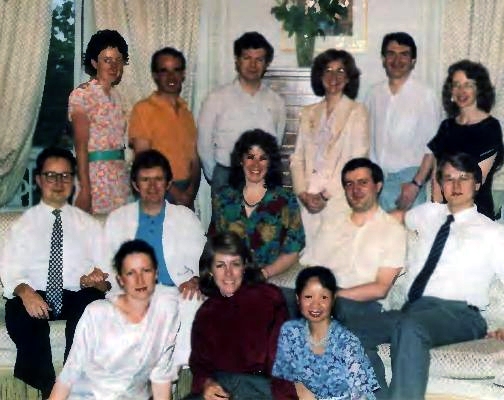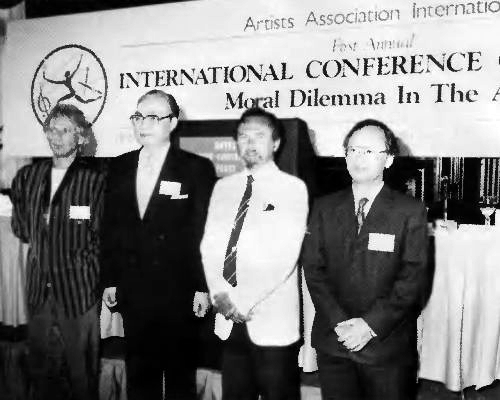![]()
The Words of the Saunders Family
|
|
The Words of the Saunders Family |

Violin
virtuoso Mr. Aaron Rosand, who visited Father in Danbury, performs at
the Gala Banquet, accompanied by pianist Howard Aibel.
Art is inherently passionate, informative, and provocative. From prehistoric times to the present, art has been a vehicle for the expression of men's passions, from his sacred ideas to his greatest apprehensions and fears."
These were the words of Dr. Bo Hi Pak as he delivered his opening address at the first annual International Conference on the Arts, sponsored by Artists Association International. Held in Paris, France, from August 20-23, sixty participants from around the world offered their ideas and opinions in an emotionally and intellectually charged exchange on the theme: "The Moral Dilemma in the Arts:"
It is Father's firm conviction that artists, through their creative endeavors, have a great potential to change the world. To help liberate this potential, he founded the Artists Association International (AAI) in January 1986 as an international forum for those artists and organizations that desire to advance the highest ideals in art. As a project of AAI, the International Conference on the Arts (ICA) will convene annually, gathering together world-renowned representatives from the fields of music, dance, theater, literature, the fine arts, and the visual arts. Participants at these conferences meet to explore the artist's role in enhancing communication and understanding among all peoples -- utilizing the tremendous ethical and moral power of the arts to transcend the barriers of race, language, culture, and religion.
At the Opening Plenary Session, Mr. Charles de Chambrun, a representative from the French Parliament, welcomed the participants to Paris, the "City of Lights: The Opening Plenary Address was delivered by Dr. Bo Hi Pak, president of AAI, who had just flown in from New York overnight. In his speech Dr. Pak explained the purpose of the conference:
It is my belief that God's plan for mankind and creation has always been to establish an ideal of love, and that artists, as co-creators, have a unique opportunity and a responsibility to convey this ideal in their art. It is the sincere hope of the founder that Artists Association International and the International Conference on the Arts are ideas whose time has come. ICA is your vehicle, your instrument, that is created today to fulfill and actualize your hopes and your dreams, as a great artist, for the sake of humanity.
Three of the many dignitaries at this conference served as honorary co-chairmen. Tsing-fang Chen, a highly respected painter and iconographer from Taiwan with a doctorate from the Sorbonne in Paris, was spokesman for the fine arts; Ivan Nagy, former premiere dancer with the American Ballet Theater and currently the artistic director of the Cincinnati-New Orleans Ballet, was the representative for dance; and Aaron Rosand, world-renowned concert violinist and head of the Violin Department at the Curtis Institute of Music, represented the field of music. Dr. Chen asked if, indeed, "the dawn of a new renaissance on a global scale" were coming, and if so, what is the responsibility of artists toward the possible emergence of an "age of love He further asserted that in this computerized age, what was needed was not more computer hardware or software, but "soulware."

The
staff of the International Conference on the Arts. Back row, left to
right: Therese Delanque, Denis Dumas, lean Pierre Gabriel, Stephanie
Nishida, lean Philippe Odent, and Myrna Gabriel. Middle row, left to
right: Brian Saunders, Christopher Davies, Caroline Betancourt,
Daniel Gaucher, and Kevin Pickard. Front row: Elizabeth Raud, Sheila
Vaughn, and Mai Cuc Moine.
Ivan Nagy, in a very personal appeal to artists and the artistic community, emphasized three of the moral dilemmas presently facing the dance world:
1) Is dance today still an art form or really a sophisticated form of gymnastics (displaying technique at the expense of emotional content)?
2) Should modern dance and classical ballet be kept separate, or can we move towards a new kind of classicism that brings movement to a higher level using the best of both forms?
3) What will it take for dance to survive in the United States with government support disappearing and production costs of dance increasing?
Among other distinguished speakers at the conference were Melvin J. Lasky, editor of Encounter magazine; Jean Leduc, French film director and recipient of highest honors from the Cinematographic Institute; Bertrand Tavernier, French film director who was nominated for an Academy Award for the film "'Round Midnight"; and Arnaud de Borchgrave, editor in chief of The Washington Times and Insight magazine.
Author Richard Quebedeaux, a professor at the Unification Theological Seminary, stressed the artist's obligation to society "to point us in a direction that is more positive, toward a better world" He stated, "I think there is one absolute value in the world today, and that absolute value is goodness. It is strongly related to truth and beauty, which are the very prerogatives of the artist and the writer. What is goodness? Goodness is the practice of love." He further pointed out that the practice of love is nothing other than the practice of service and sacrifice.
By and large, the conference participants did recognize the necessity for artists to offer inspiration that could contribute toward the betterment of society. However, as to whether or not an artist has an obligation to society was an issue that generated many differing opinions. David Eaton, conductor of the New York City Symphony, in the session entitled "Social Change: What Is the Artist's Obligation?" quoted the 20th-century German composer Paul Hindemith, "...once an artist or composer understands that music has moral and ethical power, he should use that power with the severest sense of moral responsibility" Michael Gibson, art critic for the Paris-based International Herald Tribune, added, "The underlying assumption that has led to this meeting appears to be that there is a crisis on. I'm inclined to agree. It is neither a crisis of idealism, however, nor is it a crisis of the arts. It is a crisis of culture in general. In other words, a crisis of meaning and purpose, which is naturally, if incidentally, reflected in the arts"
The climax of the conference was the Gala Banquet and Entertainment on Saturday night. Father mentioned on a number of occasions that the entertainment banquets at these conferences will soon become a world-famous tradition. Such was the "feeling in the air" on this night. After a sumptuous meal, Mrs. Caroline Betancourt, hostess for the conference, announced the inception of the Young Artists Program, a new project of AAI, conceived from the desire to help promote aspiring young artists worldwide. The Young Artists Program is in two parts: the Young Artists Scholarship Award, which offers a cash award for the education of promising students, and the Young Artists Debut Award, which provides a performance opportunity for aspiring artists.
The entertainment for the evening encompassed a wide spectrum of international music from many centuries. Lorin Hollander, with great breadth and dignity, performed keyboard selections from Johann Sebastian Bach; Somei Ohtsuki held the audience in a zen-like trance with koto music from Japan; virtuoso pianist Earl Wild aroused the audience with the piano music of Maurice Ravel; and Aaron Rosand, with Howard Aibel as his accompanist, dazzled the audience with Romantic virtuosity and bravura. The conference participants were deeply moved, some to the point of tears.
On the next and last day, many of the artists commented both in personal conversations and from the podium that they had been touched more deeply here than at any other conference they had ever attended. All the participants and staff felt grateful for the success of this first International Conference on the Arts -- a long-awaited dream come true.
When the staff reported the conference success to Father at East Garden on August 31, he was very happy. He told them:
Art is like the flower, the bud, of culture. Therefore, those in the artistic world represent a flower itself, imparting a fragrance, a beautiful, lovely, unforgettable fragrance.... Music, fine arts, and dance each have special characteristics. The fine arts represent history, dance represents tradition, and music represents the way of life. Among the three, the most sensitive and vital and rewarding path is given by music. Music is able to quickly evoke a variety of feelings; joy, sorrow, and all the convolutions of human emotions can be readily expressed by music. The creation of music is probably the most rewarding creative activity.
Staff members for this event included Caroline Betancourt, AAI vice president; Kevin Pickard, AAI vice president; Brian Saunders, ICA conference director; Christopher Davies, AAI European regional director; Daniel Gaucher, AAI French national director; Stephanie Nishida, administrative assistant; and Sheila Vaughn, head of hospitality.
The next conference will be held in August 1988 in New York City.

Dr.
Bo Hi Pak with the three honorary co-chairmen of the conference. Left
to right: Mr. Ivan Nagy, Dr. Pak, Mr. Aaron Rosand, and Mr.
Tsing-fang Chen.
On the night of the Gala Banquet and Entertainment we were treated to performances that drew tears and wild applause from the audience. Father said that in future Arts Conferences, such performances will be held every evening, and these evenings will be so prestigious that the greatest artists in the world will beg to be able to perform for free.
* * *
At the Closing Plenary Session on the final morning, Richard Quebedeaux gave a most eloquent and moving testimony to Father and our members. He said:
If you want to know what Rev. Moon is like, look at the people who have been serving you for the last three days.... If you asked them what you should do with the inspiration you have received from this conference, they might be rather reticent, suggesting you just try and do what you are doing better.... People sometimes wonder why they do this, what's the catch. There is no catch. If you asked Rev. Moon what to do, he would be more explicit: "Love God more, and if you can't believe in God, at least serve and love other people...You may think it's difficult to be an artist; from my observation it's much more difficult to be a Moonie.
For me the most moving experience of the Gala Banquet was when Caroline Betancourt, vice president of AAI, introduced Dr. Bo Hi Pak. As she spoke of Dr. Pak with such a pure and loyal heart, she gave us a real lesson in truly fulfilling the role of John the Baptist. We may see many problems in our church and sometimes get frustrated, but in their relationship I could feel the fresh spirit of harmony that True Parents want to bequeath to us.
* * *
Brian Saunders made one of the most pertinent statements of the whole conference: "For me, the moral dilemma in the arts comes from the moral dilemma in the artist. What is important to me as an artist is how I live my everyday life."
* * *
It was quite obvious from the remarks of the speakers at the Closing Plenary Session, the spirit of them even more than the content, that everyone had found the conference a very fulfilling experience. Members who had attended other conferences were surprised that no one was "negative surprised at the heartfelt positive statements the participants made about "us," and surprised at the interest some of them showed in the inner motivation of our work.
* * *
Ultimately the success of the conference was not so much in the organization, although everybody did praise that. The success was also not due to the intellectual content of the discussions. It was not in anything external, but in the spirit. The winning factor was in Father's training us to always support each other in the one essential common cause -- building a world of goodness. Somehow the conditions were created here for God's love to embrace everyone, and when that happens, success is guaranteed. As Kevin Pickard said, "It was the best and most successful workshop I ever attended" And it was only our first!